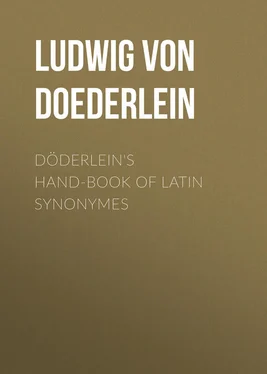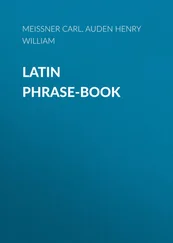Ludwig Doederlein - Döderlein's Hand-book of Latin Synonymes
Здесь есть возможность читать онлайн «Ludwig Doederlein - Döderlein's Hand-book of Latin Synonymes» — ознакомительный отрывок электронной книги совершенно бесплатно, а после прочтения отрывка купить полную версию. В некоторых случаях можно слушать аудио, скачать через торрент в формате fb2 и присутствует краткое содержание. Издательство: Иностранный паблик, Жанр: Языкознание, foreign_antique, foreign_prose, на английском языке. Описание произведения, (предисловие) а так же отзывы посетителей доступны на портале библиотеки ЛибКат.
- Название:Döderlein's Hand-book of Latin Synonymes
- Автор:
- Издательство:Иностранный паблик
- Жанр:
- Год:неизвестен
- ISBN:нет данных
- Рейтинг книги:3 / 5. Голосов: 1
-
Избранное:Добавить в избранное
- Отзывы:
-
Ваша оценка:
- 60
- 1
- 2
- 3
- 4
- 5
Döderlein's Hand-book of Latin Synonymes: краткое содержание, описание и аннотация
Предлагаем к чтению аннотацию, описание, краткое содержание или предисловие (зависит от того, что написал сам автор книги «Döderlein's Hand-book of Latin Synonymes»). Если вы не нашли необходимую информацию о книге — напишите в комментариях, мы постараемся отыскать её.
Döderlein's Hand-book of Latin Synonymes — читать онлайн ознакомительный отрывок
Ниже представлен текст книги, разбитый по страницам. Система сохранения места последней прочитанной страницы, позволяет с удобством читать онлайн бесплатно книгу «Döderlein's Hand-book of Latin Synonymes», без необходимости каждый раз заново искать на чём Вы остановились. Поставьте закладку, и сможете в любой момент перейти на страницу, на которой закончили чтение.
Интервал:
Закладка:
Commissatio, see Epulæ .
Comitari; Deducere; Prosequi. Comitari means to accompany for one’s own interest, ἀκολουθεῖν; deducere, from friendship, with officiousness; prosequi, from esteem, with respect, προπέμπειν. (vi. 73.)
Comitas, see Humanitas .
Comitia, see Concilium .
Commentari, see Cogitare .
Committere, see Fidere .
Commodare; Mutuum Dare. Commodare means to lend without formality and stipulation, on the supposition of receiving the thing lent again when it is done with. Mutuum dare is to grant a loan on the supposition of receiving an equivalent when the time of the loan expires. Commodatio is an act of kindness; mutuum datio is a matter of business. (iv. 137.)
Communicare, see Impertire .
Comœdus, see Actor .
Compar, see Æquus .
Compedes, see Vincula .
Compendium, see Lucrum .
Compescere, see Coercere .
Complecti, see Amplecti .
Complementum; Supplementum. Complementum serves, like a keystone, to make anything complete, to crown the whole, whereas supplementum serves to fill up chasms, to supply omissions.
Conari, see Audere .
Concedere; Permittere; Connivere. Concedere and permittere mean, to grant something which a man has full right to dispose of; concedere, in consequence of a request or demand, in opp. to refusing, like συγχωρῆσαι; permittere, from confidence in a person, and liberality, in opp. to forbidding, like ἐφεῖναι; whereas indulgere and connivere mean to grant something, which may properly be forbidden; indulgere (ἐνδελεχεῖν?), from evident forbearance; connivere (κατανεύειν), from seeming oversight.
Concessum est; Licet; Fas est. Concessum est means, what is generally allowed, like ἔξεστι, and has a kindred signification with licet, licitum est, which mean what is allowed by human laws, whether positive, or sanctioned by custom and usage, like θέμις ἐστί; fas est means what is allowed by divine laws, whether the precepts of religion, or the clear dictates of the moral sense, like ὅσιόν ἐστι. (v. 167.)
Concilium; Concio; Comitia; Cœtus; Conventus. 1. Concilium, concio, and comitia are meetings summoned for fixed purposes; concilium (ξυγκαλεῖν), an assembly of noblemen and persons of distinction, of a committee, of the senate, the individual members of which are summoned to deliberate, like συνέδριον; whereas concio and comitia mean a meeting of the community, appointed by public proclamation, for passing resolutions or hearing them proposed; concio (ciere, κιών) means any orderly meeting of the community, whether of the people or of the soldiery, in any state or camp, like σύλλογος; comitia (from coire) is an historical term, confined to a Roman meeting of the people, as ἐκκλησία to an Athenian, and ἁλία to a Spartan. 2. Cœtus and conventus are voluntary assemblies; cœtus (from coire) for any purpose, for merely social purposes, for a conspiracy, and so forth, like σύνοδος; whereas conventus, for a serious purpose, such as the celebration of a festival, the hearing of a discourse, and so forth, like ὁμήγυρις, πανήγυρις. (v. 108.)
Conclave, Cubiculum. Conclave is the most general term for any closed room, and especially a room of state; cubiculum is a particular expression for a dwelling-room. (vi. 75.)
Concordia, see Otium .
Concubina, see Pellex .
Condere, see Celare and Sepelire .
Conditio; Status. Conditio (ξύνθεσις, συνθεσία) is a state regulated by the will; status is a state arising from connection. Cic. Fam. xii. 23. Omnem conditionem imperii tui, statum que provinciæ demonstravit mihi Tratorius. (vi. 76.)
Confestim, see Repente .
Confidentia, see Fides .
Confidere, see Fidere .
Confinis, see Vicinus .
Confisus; Fretus. Confisus means, subjectively, like securus , depending on something, and making one’s self easy, πεποιθῶς; whereas fretus (φρακτός, ferox) means, objectively, like tutus , protected by something, ἐῤῥωμένος. (i. 20.)
Confiteri, see Fateri .
Confligere, see Pugnare .
Confutare, see Refutare .
Congeries, see Acervus .
Conjux, see Femina .
Connivere, see Concedere .
Consanguineus, see Necessarius .
Conscendere, see Scandere .
Consecrare, see Sacrare .
Consequi, see Invenire .
Conjugium; Matrimonium; Contubernium; Nuptiæ. Conjugium and matrimonium denote the lasting connection between man and wife, for the purpose of living together and bringing up their offspring; conjugium is a very general term for a mere natural regulation, which also takes place among animals; contubernium means the marriage connection between slaves; matrimonium, the legal marriage between freemen and citizens, as a respectable and a political regulation; whereas nuptiæ means only the commencement of matrimonium , the wedding, or marriage-festival.
Considerare; Contemplari. Considerare (from κατιδεῖν) denotes consideration as an act of the understanding, endeavoring to form a judgment; contemplari (from καταθαμβεῖν) an act of feeling, which is absorbed in its object, and surrenders itself entirely to the pleasant or unpleasant feeling which its object excites. (v. 130.)
Consors, see Socius .
Conspectus, Conspicere, see Videre .
Constat; Apparet; Elucet; Liquet. Constat means a truth made out and fixed, in opp. to a wavering and unsteady fancy or rumor; whereas apparet, elucet, and liquet denote what is clear and evident; apparet, under the image of something stepping out of the back-ground into sight; elucet, under the image of a light shining out of darkness; liquet, under the image of frozen water melted. (vi. 78.)
Constituere, see Destinare .
Consuetudo; Mos; Ritus; Cærimonia. Consuetudo denotes the uniform observance of anything as a custom, arising from itself, and having its foundation in the inclination or convenience of an individual or people, ἔθος; whereas mos (modus) is the habitual observance of anything, as a product of reason, and of the self-conscious will, and has its foundation in moral views, or the clear dictates of right, virtue, and decorum, ἦθος; lastly, ritus denotes the hallowed observance of anything, either implanted by nature as an instinct, or introduced by the gods as a ceremony, or which, at any rate, cannot be traced to any human origin. Consuetudines are merely factitious, and have no moral worth; mores are morally sanctioned by silent consent, as jura and leges by formal decree; ritus (from ἀριθμός, ῥυθμός), are natural, and are hallowed by their primæval origin, and are peculiar to the animal. (v. 75.) 2. Ritus is a hallowed observance, as directed and taught by the gods or by nature; whereas cærimonia (κηδεμονία) is that which is employed in the worship of the gods.
Consuevisse, see Solere .
Consummare, see Finire .
Contagium, see Lues .
Contaminare; Inquinare; Polluere. Contaminare (from contingo, contagio) means defilement in its pernicious effect, as the corruption of what is sound and useful; inquinare (from cunire, or from πίνος), in its loathsome effect, as marring what is beautiful, like μορύσσειν; polluere (from pullus, πελλός), in its moral effect, as the desecration of what is holy and pure, like μιαίνειν. Cic. Cæcil. 21, 70. Judiciis corruptis et contaminatis ; compare with Cœl. 6. Libidinibus inquinari ; and Rosc. Am. 26, 71. Noluerunt in mare deferri, ne ipsum pollueret , quo cætera quæ violata sunt, expiari putantur. (ii. 56.)
Читать дальшеИнтервал:
Закладка:
Похожие книги на «Döderlein's Hand-book of Latin Synonymes»
Представляем Вашему вниманию похожие книги на «Döderlein's Hand-book of Latin Synonymes» списком для выбора. Мы отобрали схожую по названию и смыслу литературу в надежде предоставить читателям больше вариантов отыскать новые, интересные, ещё непрочитанные произведения.
Обсуждение, отзывы о книге «Döderlein's Hand-book of Latin Synonymes» и просто собственные мнения читателей. Оставьте ваши комментарии, напишите, что Вы думаете о произведении, его смысле или главных героях. Укажите что конкретно понравилось, а что нет, и почему Вы так считаете.












